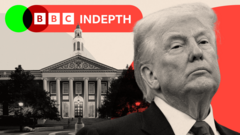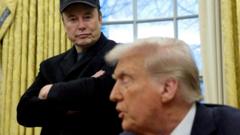The EU's robust reaction comes as the proposed 50% tariffs threaten to destabilize trade relations and ongoing negotiations.
EU Responds Strongly to U.S. Decision to Increase Steel Tariffs

EU Responds Strongly to U.S. Decision to Increase Steel Tariffs
The European Union expresses significant regret over U.S. President Trump's announcement of elevated steel and aluminum tariffs.
In a surprising announcement this past Friday, U.S. President Donald Trump revealed plans to double tariffs on steel and aluminum imports from 25% to 50%. This decision, he asserted during a rally in Pittsburgh, aims to bolster local industries and enhance national supplies while minimizing reliance on foreign producers, particularly China.
The European Commission voiced its dismay on Saturday, emphasizing that this move “undermines ongoing efforts” to reach amicable trade solutions and could lead to retaliation measures. The Commission warned that these increased tariffs could create further economic uncertainty and elevate operating costs for businesses and consumers across both continents.
The UK, recently exited from the EU, is now grappling with implications surrounding a preliminary zero-tariff agreement with the United States on steel and aluminum, raising concerns over future negotiations. A government representative indicated they are actively seeking clarity from U.S. officials regarding these tariff changes.
In response to Trump’s decision, the European Commission highlighted a strategic pause in previously planned countermeasures as a goodwill gesture to facilitate negotiations. However, they are now prepared to impose these countermeasures if necessary.
Trump’s announcement includes promises of job security for U.S. steelworkers and an investment of $14 billion in local steel production by US Steel in partnership with Japan’s Nippon Steel. Despite these assurances, ongoing legal challenges regarding the administration's tariffs add another layer of complexity to the situation, as appeals courts have permitted the existing tariffs to remain in place amid legal scrutiny.
This latest tariff announcement follows a series of back-and-forth negotiations with the EU, where Trump previously delayed discussions on varying tax rates. His latest statements have created an atmosphere of uncertainty that significantly impacts both bilateral trade discussions and the global steel market amid fears of a potential trade war.
The European Commission voiced its dismay on Saturday, emphasizing that this move “undermines ongoing efforts” to reach amicable trade solutions and could lead to retaliation measures. The Commission warned that these increased tariffs could create further economic uncertainty and elevate operating costs for businesses and consumers across both continents.
The UK, recently exited from the EU, is now grappling with implications surrounding a preliminary zero-tariff agreement with the United States on steel and aluminum, raising concerns over future negotiations. A government representative indicated they are actively seeking clarity from U.S. officials regarding these tariff changes.
In response to Trump’s decision, the European Commission highlighted a strategic pause in previously planned countermeasures as a goodwill gesture to facilitate negotiations. However, they are now prepared to impose these countermeasures if necessary.
Trump’s announcement includes promises of job security for U.S. steelworkers and an investment of $14 billion in local steel production by US Steel in partnership with Japan’s Nippon Steel. Despite these assurances, ongoing legal challenges regarding the administration's tariffs add another layer of complexity to the situation, as appeals courts have permitted the existing tariffs to remain in place amid legal scrutiny.
This latest tariff announcement follows a series of back-and-forth negotiations with the EU, where Trump previously delayed discussions on varying tax rates. His latest statements have created an atmosphere of uncertainty that significantly impacts both bilateral trade discussions and the global steel market amid fears of a potential trade war.




















